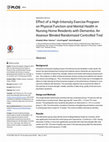Papers by Astrid Bergland
Physical & Occupational Therapy in Geriatrics, Jul 2, 2013
Scandinavian Journal of Caring Sciences, Mar 1, 2011
Dementia and geriatric cognitive disorders extra, Dec 15, 2020
Clinical Interventions in Aging, 2021

BMC Geriatrics, 2020
Background Hip fractures represent a global public health issue that demands high cost both from ... more Background Hip fractures represent a global public health issue that demands high cost both from the patient and from the society. Functional exercise in the subacute phase of a hip fracture is essential in reducing these costs. To the best of our knowledge, no qualitative study has explored the patients’ experiences in participating in an exercise program during the first month after surgery. Thus, this study aims to explore how older people who had participated in an evidence-based exercise intervention describe their relationship with their therapists and how this relationship might contribute to their motivation for exercise. Methods Thirteen women and six men, who all had experienced a hip fracture and were staying in the same short-term rehabilitation unit, were interviewed by the last author. The interviews lasted from 30 to 70 min. The participants’ mean age was 86 years and they had all participated in a High Intensity Functional Exercise (HIFE) program in one-on-one sessio...

BMC Musculoskeletal Disorders, 2020
Background Exercise is recommended for individuals with vertebral fractures, but few studies have... more Background Exercise is recommended for individuals with vertebral fractures, but few studies have investigated the effect of exercise on outcomes of importance for this population. Post-intervention effects of exercise are even less studied. The objective of this study was to evaluate habitual walking speed and other health-related outcomes after cessation of a 3-month exercise intervention. Methods This follow-up study was conducted 3 months post-intervention of a randomised controlled trial. A total of 149 community-dwelling Norwegian women aged 65 years or older, diagnosed with osteoporosis and vertebral fracture were randomised into either exercise or control group. Primary outcome was habitual walking speed at 3 months. Secondary outcomes were other measures of physical fitness – including the Four Square Step Test (FSST), functional reach, grip strength and Senior Fitness Test – measures of health-related quality of life and fear of falling. Herein we report secondary data ana...

BMJ Open, 2019
IntroductionHealth professions need to prepare for the increase of older patients with osteoarthr... more IntroductionHealth professions need to prepare for the increase of older patients with osteoarthritis requiring health services including those requiring total joint arthroplasty (TJA). The primary objective of this study is to assess the effect of a tailored prehabilitation programme of older patients awaiting primary surgery for total hip replacement on physical function measured by walking speed within 1 week after intervention as well as 6 weeks and 3 months after TJA surgery.Methods and analysisThis is a single-blinded randomised controlled trial. The participants are 70 years or older, scheduled for primary total hip replacement due to late stage osteoarthritis. The intervention group will receive patient education and exercise for 6–12 weeks. The control group will receive care as usual. The primary outcome is gait speed. Secondary outcomes are lower body strength, mobility, aerobic capacity, activity of daily living, length of stay at the hospital, referral to an inpatient r...

BMC Geriatrics, 2019
BackgroundFalls and fall-related injuries exacerbate the health problems of older adults, and the... more BackgroundFalls and fall-related injuries exacerbate the health problems of older adults, and they are a public health concern. Despite an abundance of research, the implementation of evidence-based fall prevention programs has been slow and limited, additionally and these programs have not reduced the incidence of falling. Therefore, the primary objective of the present study was to examine patients and physiotherapists’ views on the factors that influence the implementation of the community- and evidence-based Otago Exercise Programme for fall prevention.MethodsWe conducted eight in-depth interviews with physiotherapists and patients, and a focus group interview with 12 physiotherapists and authority figures who represented local hospitals and municipalities. The resultant qualitative data were subjected to thematic analysis.ResultsThe analysis yielded two main themes:the researcher’s role and position in the implementation processandthe tension between research-based knowledge an...
BMC Musculoskeletal Disorders, 2018
BMC Health Services Research, 2017

BMC health services research, Jan 14, 2017
Falls and fall-related injuries in older adults are associated with great burdens, both for the i... more Falls and fall-related injuries in older adults are associated with great burdens, both for the individuals, the health care system and the society. Previous research has shown evidence for the efficiency of exercise as falls prevention. An understudied group are older adults receiving home help services, and the effect of a falls prevention programme on health-related quality of life is unclear. The primary aim of this randomised controlled trial is to examine the effect of a falls prevention programme on quality of life, physical function and falls efficacy in older adults receiving home help services. A secondary aim is to explore the mediating factors between falls prevention and health-related quality of life. The study is a single-blinded randomised controlled trial. Participants are older adults, aged 67 or older, receiving home help services, who are able to walk with or without walking aids, who have experienced at least one fall during the last 12 months and who have a Min...

BMC geriatrics, Jan 3, 2015
Research indicates that exercise can have a positive effect on both physical and mental health in... more Research indicates that exercise can have a positive effect on both physical and mental health in nursing home patients with dementia, however the lasting effect is rarely studied. In a previously published article we investigated the immediate effect of a 12 weeks functional exercise program on physical function and mental health in nursing home residents with dementia. In this paper we studied the long-term effect of this exercise program. We explored the differences between the exercise and control group from baseline to 6 months follow-up and during the detraining period from month 3 to 6. A single blind, randomized controlled trial was conducted and a total of 170 nursing home residents with dementia were included. The participants were randomly allocated to an intervention (n = 87) or a control group (n = 83). The intervention consisted of intensive strengthening and balance exercises in small groups twice a week for 12 weeks. The control condition was leisure activities. Thir...

Dementia and Geriatric Cognitive Disorders Extra, 2015
Background: The number of patients with cognitive impairment following stroke is increasing due t... more Background: The number of patients with cognitive impairment following stroke is increasing due to the rise in the number of stroke survivors. Health authorities highlight the need for prediction and early diagnostics. The aims of this study were to investigate if balance and mobility may predict cognitive impairment 1 year after stroke. Methods: The participants were patients with first-ever stroke or transient ischaemic attack (TIA). The exclusion criteria were pre-stroke cognitive impairment and dementia. Measurements of balance comprised the Berg Balance Scale (BBS) and the Figure of Eight test (Fig8). Mobility was measured by maximum walking speed and the Timed Up and Go test. Dementia and mild cognitive impairment were merged into a main outcome: cognitive impairment. Unadjusted and adjusted multivariate logistic regression models were performed. Results: One hundred and eighty subjects performed balance and mobility measures at baseline, and 158 participated in the follow-up;...

PloS one, 2015
Dementia is among the leading causes of functional loss and disability in older adults. Research ... more Dementia is among the leading causes of functional loss and disability in older adults. Research has demonstrated that nursing home patients without dementia can improve their function in activities of daily living, strength, balance and mental well being by physical exercise. The evidence on effect of physical exercise among nursing home patients with dementia is scarce and ambiguous. Thus, the primary objective of this study was to investigate the effect of a high intensity functional exercise program on the performance of balance in nursing home residents with dementia. The secondary objective was to examine the effect of this exercise on muscle strength, mobility, activities of daily living, quality of life and neuropsychiatric symptoms. This single blinded randomized controlled trial was conducted among 170 persons with dementia living in nursing homes. Mean age was 86.7 years (SD = 7.4) and 74% were women. The participants were randomly allocated to an intervention (n = 87) or...

Scandinavian Journal of Caring Sciences, 2011
Scand J Caring Sci; 2011; 25; 679–687
Cognitive screening tests as experienced by older hospita... more Scand J Caring Sci; 2011; 25; 679–687
Cognitive screening tests as experienced by older hospitalised patients: a qualitative studyOlder people admitted to geriatric wards in hospitals are often screened for cognitive impairments. The validity and diagnostic concerns of cognitive screening tests have been subjected to comprehensive research. However, the qualitative knowledge available on how older patients themselves experience these screening tests is limited. The aim of this study is to explore the cognitive screening test experience from the older patients’ perspective. Drawing on fieldwork, qualitative interviews were performed with 18 older patients who had completed cognitive screening tests while hospitalised. Data from the interviews were analysed according to a phenomenological approach. The results were supported by Nordenfelt’s theory on dignity of identity, which underscores that dignity is related to integrity, autonomy, life history and relationships. The findings su...










Uploads
Papers by Astrid Bergland